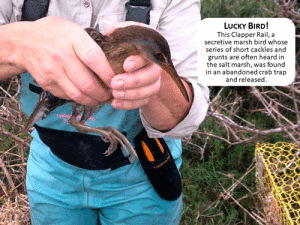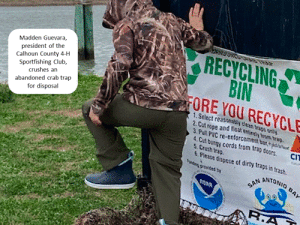
Abandoned crab traps are unsightly litter, navigation hazards and they can entrap and kill crabs, fish, and turtles (ghost fishing) and land-based animals too when washed ashore. This is why in 2001, the Texas Legislature passed Senate Bill 1410 creating a ten-day crab trap closure that begins the third Friday of each February. During this year’s closure period (February 18-27, 2022), volunteers and agencies scoured Aransas, San Antonio, and Matagorda Bay systems in a coordinated effort to locate and remove derelict crab traps. Despite six of the ten days being lost to bad weather, a total of 1047 traps were removed. This was a result of the effort performed by 184 people and 61 boats. In 2021 and 2020, 1203 and 1632 traps were removed, respectively.
The location, content and ownership of each trap is documented on a phone app which displays on a shared map. Full analysis of this data will help inform future efforts to reduce trap dereliction. Allan Berger, who coordinated the cleanup effort for San Antonio Bay, made the following observations of this year’s results:
• Most of the traps removed were at the shoreline or on shore, the result of high winds and tides during Hurricane Nicolas.
• Winter Storm Uri killed mangroves which exposed older traps on the shoreline.
• Traps removed from open water were down significantly from previous years due to diligent efforts by commercial crabbers to pick up their traps prior to the closure period.
• Bad weather hampered cleanup efforts. Only 4 days offered workable weather, leaving several areas unsearched.
The volunteer activities were coordinated by the Mission-Aransas National Estuary Research Reserve, the San Antonio Bay Partnership, and the Matagorda Bay Foundation. Boats and volunteers came from numerous local organizations: CCA chapters, GBRA, LNRA, GBR Trust, TPWD, USFW, TMN, CBBEP, UTMSI, ICF, Dallas Zoo, Texas Sea Grant, and concerned citizens. Special thanks to the Calhoun High School Navy ROTC students and Madden Guevara, president of the Calhoun County 4-H Sportfishing Club for manning the TPWD Dock in Port O’Connor to unload boats and process the cleaner traps for metal recycling.
For the past two years the cleanup has been funded by a NOAA Marine Debris Removal grant obtained by the Coastal Bend Bays & Estuaries Program and supplemented by local sponsors Guadalupe Blanco River Trust and Guadalupe Blanco River Authority.
Berger emphasizes that the program’s success is due to the efforts of the volunteers and agencies noted above, as well as the commercial crabbers’ efforts to improve management of their traps. Together, we can keep our Bays clean and productive. To sign up for notifications related to next year’s efforts, contact Allan Berger at AllanRBerger@outlook.com.
-Brigid Berger

